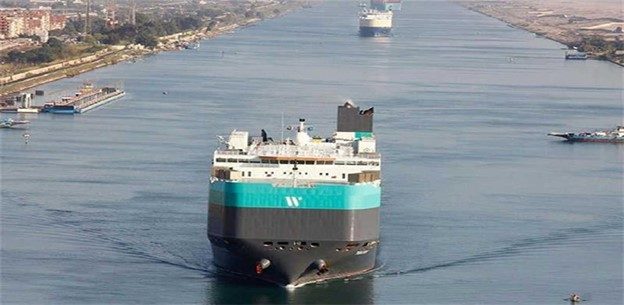
Egypt’s cabinet approved in a meeting yesterday the establishment of a new Suez Canal holding company to control two state-run companies that belonged to the Suez Canal Authority (SCA), the cabinet said in a statement.
However, after launching this new company, some observers wonder if the Suez Canal franchise will be sold through this company!
The Egyptian Cabinet on Wednesday, 7 June, authorized the creation of a new company under the name: Suez Canal Holding Company for Industries and Naval Services and Investments.
The new company will be headquartered in the northeastern city of Ismailia and will be subject to the public business sector provisions and regulations.
According to a Cabinet statement, the decision to establish the new company was issued based on the Public Business Sector Law 203/1991.
In tandem, the cabinet transferred of ownership of Canal Mooring & Lights and The Port Said Engineering Works and Marine Construction from the Suez Canal Authority (SCA) to the newly established holding company as its subsidiaries.
The holding company is formed to boost maritime-related industrial and commercial activity, “including what is related to building, repairing and renovating ships,” said the statement.
The new company can establish other subsidiaries, but their establishment, duration, and purposes have to be determined by the SCA chairman.
“The new Suez Canal Holding Company for Industries and Naval Services and Investments aims to develop the national economy through industrial and commercial activities related to naval work, including ship building, maintenance and repair; metal works constructions; integrated projects; as well as the management and investment of the assets of its subsidiaries,” the cabinet statement stated.
The Suez Canal, which is run by the SCA, is the country’s primary sources of national income and hard currency.
The canal’s revenue recorded a historic high of $7.9 billion in 2022, up from $6.3 billion in 2021.
This year, the number of ships passing through the canal increased to 23,400, up from 21,700 in the prior year.
Moreover, the total amount of cargo passing through the canal reached a new peak of 1,420 billion tons this year, up from 1,220 billion tons in 2021.
Connecting the Mediterranean Sea and the Red Sea, the man-made canal is a major lifeline for global seaborne trade, with some 12 percent of the world trade volume passing through it.
In December, Egypt approved law change to allow sale, lease of Suez Canal’s assets.
Hossam Bahgat, the executive director of the Egyptian Initiative for Personal Rights (EIPR) tweeted, “Do you remember the law establishing the Suez Canal Fund in December?”
“Today, the cabinet approved the establishment of the Suez Canal Holding Company for Industries and Investment, with powers including, (investing the assets of its subsidiaries and related assets that have been approved to transfer its affiliation, among other powers). ‘No one saw. No one knew’, (that is, ‘what happens in Vegas stays in Vegas’),” Bahgat added.
The Egyptian Parliament on 19 December approved a draft law amending some articles of Law 30 of 1975 on the Suez Canal Authority.
The law amendment aimed at establishing a fund belonging to the Suez Canal Authority and increasing its capabilities to contribute to achieving sustainable economic development and make use of the fund’s money to purchase, sell, hire and exploit assets in the best way.
The law amendment also aimed to enable the Suez Canal Authority to deal with crises and emergency conditions resulting from exceptional circumstances and bad economic conditions and increase its capital and investments in securities.
However, lawmakers had criticised the paragraph which would allow the fund to sell or lease the authority’s assets, with a parliamentarian likening the amendment to a draft bill put forward in the 1970s to sell the pyramids of Giza.
A lawmaker of the New Wafd party, Mohammed Abdel-Alim Daoud, said during the voting session, that establishing the fund is tantamount to emptying Egypt of its money, and converting public money into private money which represent an imminent danger to the state.
“This is the Suez Canal owned by the Egyptian people, and not a public sector company that is sold at the lowest price,” he added.
A representative of the Egyptian Democratic Party, Ihab Mansour, then said the party rejects the draft law, adding that the “lack of a unified budget is one of the main defects affecting the state’s general financial policy. However, the amendment had ultimately been approved.
Open to foreign investment
“Egypt’s Suez Canal welcomes foreign investment but foreigners would have no control over the waterway or over a proposed fund that would help to manage its resources,” the head of the Suez Canal Authority (SCA) stated on 22 December, according to Reuters.
SCA Chairman Osama Rabie was speaking to reporters after legal amendments -providing for the fund- were then discussed in parliament, triggering speculation they would open the door to selling stakes in the canal to foreigners.
The fund, under discussion for several years, was designed to guard the canal’s resources for reinvestment, as well as to help it face unexpected challenges or crises, Rabie told a press conference, stated Reuters.
“We cannot sell the canal or rent it. It is the property of Egypt and the Egyptians,” Rabie said, referring to lives lost during the construction of the canal in the 1860s.
The fund would be separate from the SCA, which already works with foreign companies to develop projects, Rabie said.
“The investor will come in connection with the project that is being done, they will not come to the fund.”
The fund, under discussion for several years, was designed to guard the canal’s resources for reinvestment, as well as to help it face unexpected challenges or crises, Rabie told a press conference.
“We cannot sell the canal or rent it. It is the property of Egypt and the Egyptians,” Rabie said, referring to lives lost during the construction of the canal in the 1860s.
The fund would be separate from the SCA, which already works with foreign companies to develop projects, Rabie said. “The investor will come in connection with the project that is being done, they will not come to the fund.”
The Egyptian cabinet at the time denied that the fund was a “back door to selling the canal”.
However, after launching the new Suez Canal holding company, many people wonder, “Will the Suez Canal franchise be sold through this company?



